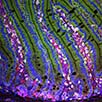Dr. Marianna Trakala uses a novel inducible mouse model in which she can generate high levels of chromosome missegregation and aneuploidy in adult mice in tissue-specific manner. By utilizing scRNA sequencing Dr. Trakala has characterized the transcriptional response in epithelial cells of the intestine and currently she is analyzing how this cell autonomous response triggers the activation of the immune system and downstream elimination of aneuploid cells from the tissue. Dr. Trakala is performing this analysis both in immunocompetent mice as well as in mice with specifically depleted immune cell populations. In addition, she has designed experiments to analyze changes of the immunopeptidome on the surface of aneuploid cells and how this alteration is related to the immune surveillance of aneuploid cells in vivo.

This picture shows the detection by immunofluorescence of CD8 (grey) and CD4 (red) Tcells in a section from the small intestine from Lgr5-EGFP-IRES-CreERT2; Cdc20(lox/AAA) mice. In magenta is detected the expression of EGFP indicating those crypts and subsequently vili where aneuploid epithelial cells are expected to accumulate.

